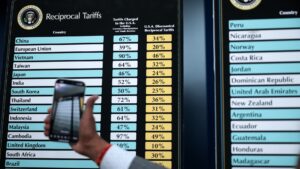Understanding the Impact of Reciprocal Tariffs: Insights from Extreme Investor Network
In the ever-evolving landscape of global trade, the recent announcement by former U.S. President Donald Trump regarding "reciprocal tariffs" has sent shockwaves through the markets and prompted a flurry of reactions from analysts and economists alike. At Extreme Investor Network, we delve deeper into the implications of this monumental trade policy change and what it means for investors and consumers alike.
A Bold New Trade Policy
On April 2, 2025, President Trump unveiled a sweeping trade policy that impacts over 180 countries and territories, revealing reciprocal tariff rates that are poised to reshape international trade dynamics. While tariffs are not a new concept, the scale and immediacy of these changes have left many investors scrambling for safe havens, leading to a notable sell-off in the stock markets.
The Analysts’ View: A Mixed Bag of Concerns
Reactions from experts regarding the newly announced tariffs have ranged from wary caution to outright alarm. For instance, Tai Hui, APAC Chief Market Strategist at J.P. Morgan Asset Management, expressed concerns that the U.S. may reach average tariff rates unseen since the early 20th century. Such an increase could lead to inflation as manufacturers struggle to maintain production, causing supply chain costs to be passed on to consumers—a trend that might trigger further spending cuts among households.
David Rosenberg, founder of Rosenberg Research, emphasized the fallacy in the notion that foreign producers would bear the brunt of these tariffs. He pointed out that it is ultimately U.S. importers who will foot the bill, leading to a projected price shock for American consumers. This call for a deeper understanding of trade mechanics is vital to navigating the sentiments currently reflected in market trends.
The Financial Ripple Effect
Anthony Raza from UOB Asset Management criticized the seemingly arbitrary nature of the tariff rates, suggesting that the timing of enforcement came far too quickly for any diplomatic negotiations. This quick shift could deepen market uncertainty, a sentiment echoed by David Roche of Quantum Strategy, who argued that these tariffs indicate a significant shift towards isolationist policies that will resonate beyond economics into the geopolitical realm.
Shane Oliver, who heads investment strategy at AMP, forecasted that the average U.S. tariff rates could soar to levels not seen since the 1930s—a historical precedent that many economists fear will usher in another recession. He indicated that the probability of a U.S. recession could now be as high as 40%, with global growth rates potentially dropping towards 2% unless effective countermeasures are employed by other nations.
Investor Strategy: Finding Stability in Uncertain Times
For investors, the road ahead may seem precarious, but there are strategies available to weather the storm. Here are a few considerations:
-
Diversification: Broadening investment portfolios to encompass a diverse range of asset classes can provide a buffer against volatility. Look into sectors that may benefit from domestic pressures, such as local manufacturing or technology.
-
Safe Haven Assets: Traditionally, commodities such as gold, as well as inflation-indexed bonds, have drawn investors seeking stability in uncertain market conditions.
-
Stay Informed: Keeping abreast of ongoing trade negotiations and potential retaliatory measures from nations like China and members of the EU can provide vital insight for long-term investment strategies.
- Consult Professional Advisors: Engaging with financial experts who understand the nuances of global trade and economic indicators can help in making informed investment decisions.
Conclusion
As the implications of reciprocal tariffs unfold, it is crucial for investors and consumers to remain informed about how these changes may affect the economic landscape. At Extreme Investor Network, we commit to providing you with the latest insights and practical strategies designed to help navigate these turbulent waters. Stay tuned as we analyze these developments and help guide you toward the path of opportunity amid economic challenges.

